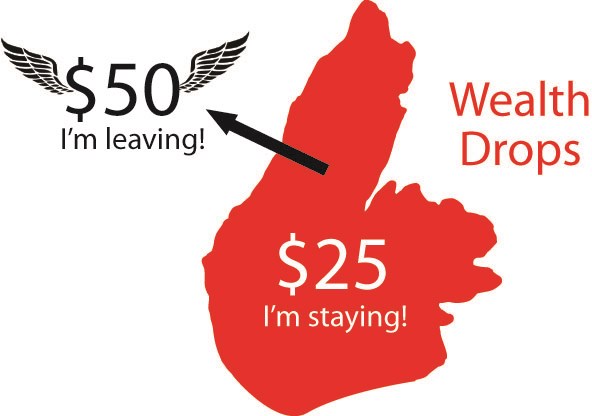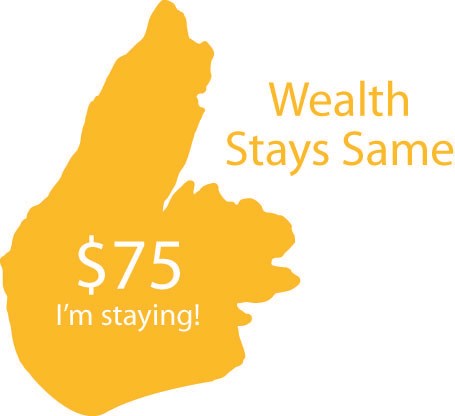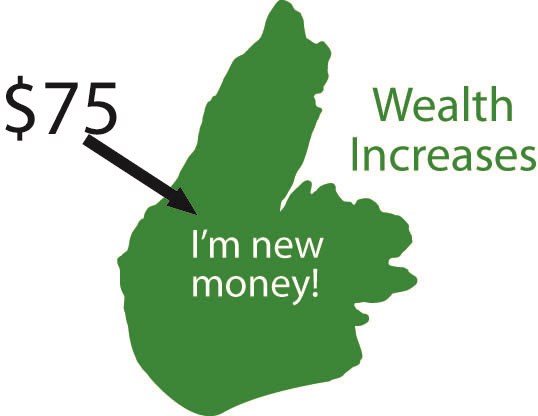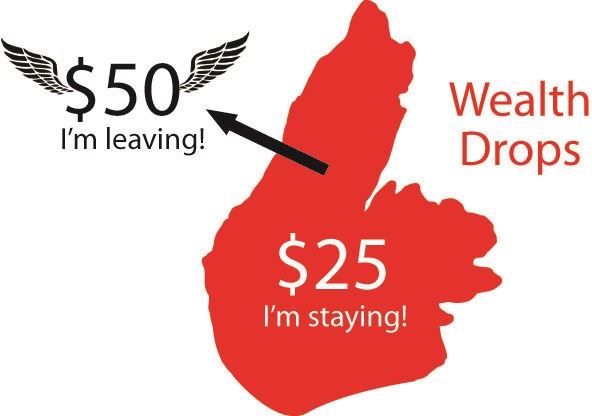The answer:
A business that CREATES products in Cape Breton and EXPORTS (sells) these products outside of Cape Breton. It could be a few large businesses or many small businesses. It all ads up.
The proof?
It's in the math. Simple math. Take a look ...
Example #1
- A local RESALE BUSINESS buys a product made elsewhere and ships it here to their store for $50.
- The business sells the product to a local consumer for $75.
- This leaves $75 - $50 = $25 for the local business.
- The local business spends this $25 on employee wages, rent, utilities, banking, local marketing, etc.
The result is that $50 leaves Cape Breton Island forever, while $25 is spent locally. Wealth drops because $50 is lost.

Example #2
- A local PRODUCT BUSINESS makes a product locally and sells it for $75.
- Since the product is made locally, the business keeps all $75.
- The local business spends this $75 on employee wages (to make and sell the product), rent, utilities, banking, local marketing, etc.
The result is that all the money stays in Cape Breton Island. $0 leaves. Wealth remains the same because money moves from buyers to makers who are all in the same region.
Economic Impact
The above example represents a ratio of 3 to 1. This means that a PRODUCT business that generates $1 million in revenue has the same positive economic impact as a RESALE business that generates $3 million. That's 3 times more local impact for each dollar made by businesses that create products locally and sell those products locally.
The BIGGEST Impact
The above examples show how money moves around in Cape Breton and leaves Cape Breton. There is no new money coming into Cape Breton. If new money does not come into Cape Breton, we are not increasing our wealth.
To clarify, the term wealth does not mean wealth for the few ... it means distributed wealth that can raise the standard of living for the entire community.
Now, let's take this a step further. Let's assume the PRODUCT BUSINESS exports (sells) its product outside of Cape Breton Island. This means that a new $75 is imported into Cape Breton every time a product is sold. This $75 adds to the wealth of Cape Breton. New money just appears ... like magic. Repeat that a few times and all of a sudden Cape Breton has a pile of money that never existed before.
This is why businesses that CREATE products in Cape Breton and EXPORT (sell) these products outside of Cape Breton are the solution to economic prosperity. This is not about BUY IN Cape Breton, this is about MADE IN Cape Breton and sold elsewhere (or sold here to people who bring money from away).
GOOD >>> Made locally and sold locally
BETTER >>> Made locally and sold elsewhere
BEST >>> Owned locally, made locally, sold elsewhere
Of course, we need to support all types of businesses, whether they make products locally or not. But, it's equally important to recognize how wealth is created.
What about service businesses like tourism? Yes, businesses that offer a service locally to people who bring money from away also fit this model.
Not from Cape Breton? You can replace "Cape Breton" above with "Yarmouth" or "Nova Scotia" or "Atlantic Canada" or any region you want. The math is the same. The economics are the same.
What next? Encourage community leaders to focus on the activities that generate wealth for the community. Share this post with friends, family, business leaders, and government officials.
This post was partly inspired by a Ted X Cape Breton talk
by Joe Menchefski - watch it here





24
Log In or Sign Up to add a comment.- 1
arrow-eseek-e1 - 10 of 10 itemsFacebook Comments